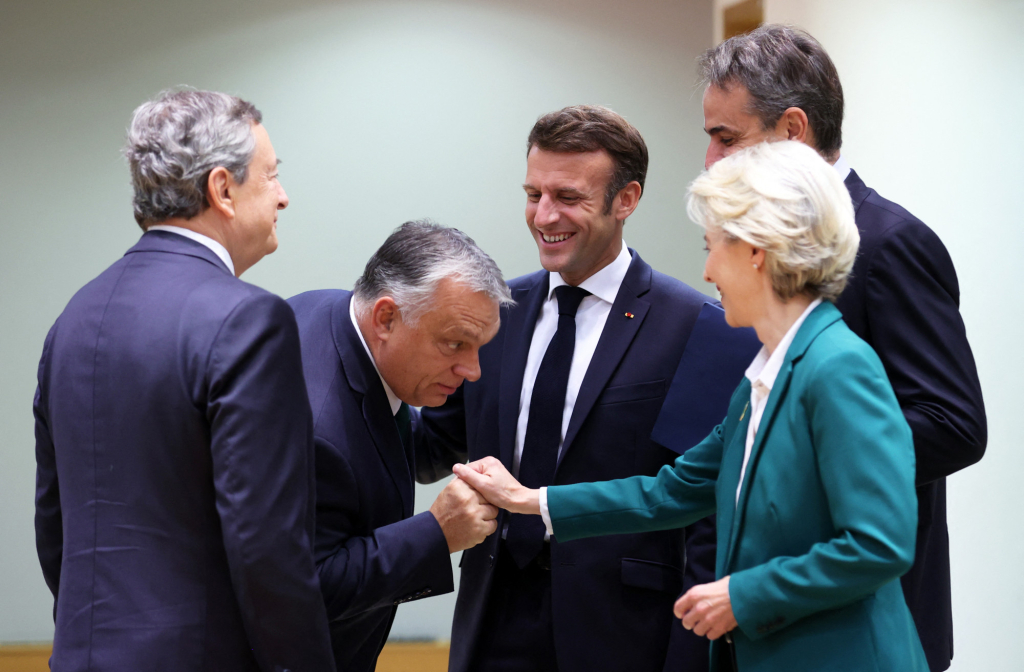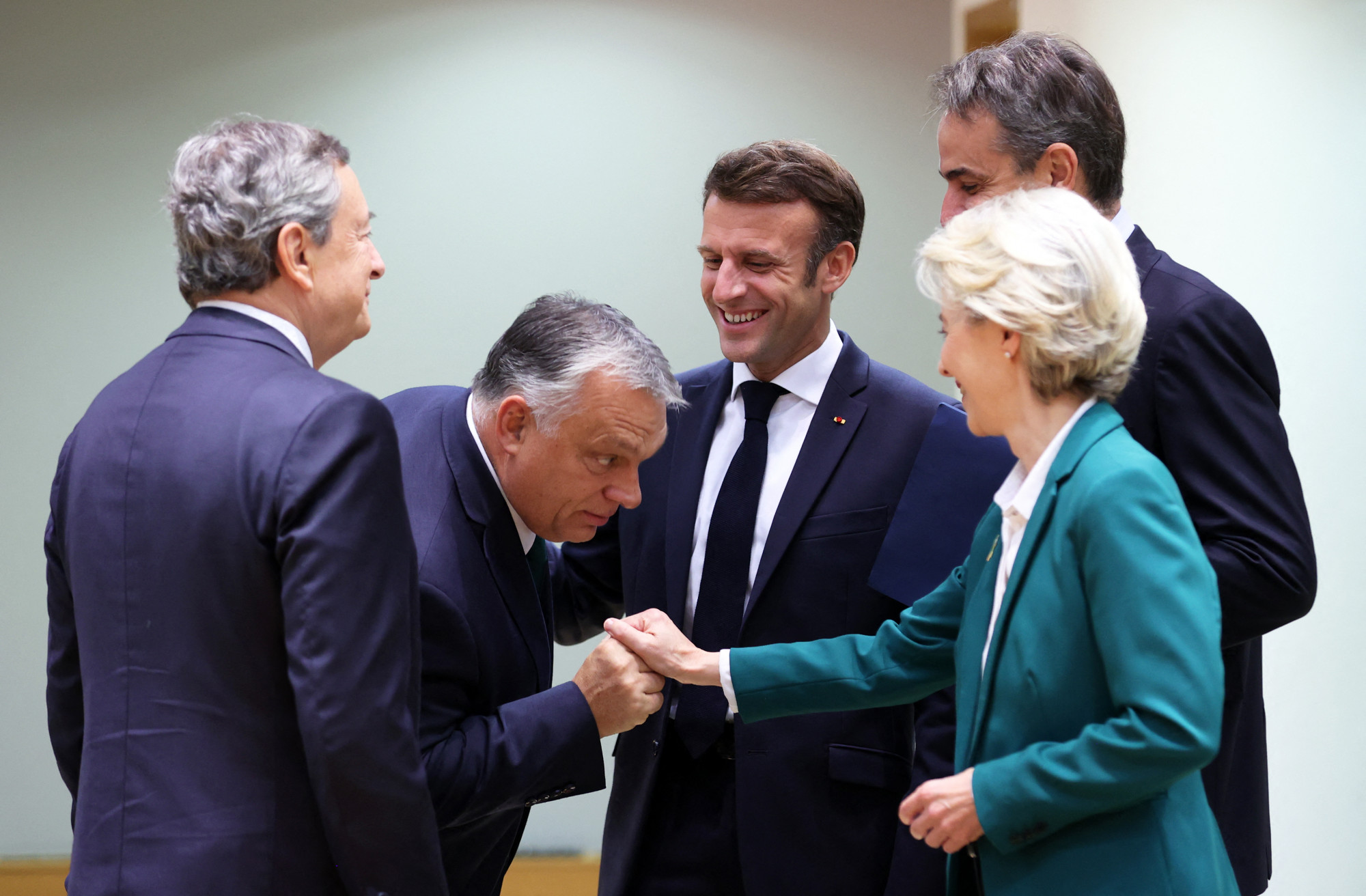Published: 9.10.2023

The recent news in the Financial Times and Politico that, if Viktor Orbán’s government agrees to an increase in the EU budget and thus to additional financial aid for Ukraine, roughly €13 billion in currently frozen funds could be transferred to Hungary almost immediately, has been a big hit with the Hungarian public.
There were some who took this as a sign that Brussels had capitulated to Orban. I must disappoint you all as the reality is something quite different. Moreover, there is more to the story than meets the eye: while the Fidesz explanation is that the EU is stalling because, among other things, they are waiting for the result of the Polish elections to see if it could weaken Orbán’s alliance system, the truth is more likely that it is, in fact, the Prime Minister of Fidesz who is stalling and does not want an agreement. He is hoping that after next year’s EP elections there will be a revolution in the EU and that he will be able to strike a much more favourable deal with the incoming European Commission. On a classic „win some, lose some” basis. In the meantime, they will just have to somehow manage with expensive foreign loans and austerity, which is still worth it for Orbán to ensure the most stable continued existence of his corrupt system possible.
The Financial Times article was quickly categorically denied by the European Commission, and Tibor Navracsics could only say that they had no knowledge of such a thing. Poor ministers, Tibor among them, most of the time know very little indeed, but that is not their fault; it is no use negotiating anything, because the odd Lord of Carmelite will decide in the end whether it is to be fulfilled. In order to see the point behind this alleged release of funds, it must first be made clear that the EUR 13 billion reported in the news is only part of the total EU envelope for Hungary. The total cohesion policy envelope is around €20 billion.
If the Hungarian government fully and completely implements the European Commission’s expectations regarding the reform of the Hungarian judicial system, which have been known for months, i.e. if it meets part of the horizontal eligibility criteria, in Brussels jargon, it will indeed have access to part of the cohesion policy envelope for Hungary. But that would not mean that Hungary would magically have access to the whole budget. Analysts and experts also differ widely on the exact amount of resources that Hungary would have access to through the implementation of the judicial reform.
There are calculations that put the figure at just €6-7 billion, instead of the €13 billion announced. The fact is that although the Hungarian government has already „declared” judicial reform to Brussels, the process is far from over, with the European Commission asking for further guarantees. There is a view – and I do not consider it illogical, knowing the nature of political games from the inside – that what was described in the Financial Times article was really just a test of how Orbán and his party would react to it, to what extent they would seek compromises.
Let us not forget that what is at stake is not just the EUR 13 billion referred to, but much more of the EU funds that we are owed. For example, in the context of the conditionality procedure, or rule of law procedure – for the first time in the history of the European Union, and for the first time ever, because of the dismantling of the rule of law framework in a Member State – a decision has been taken to freeze around EUR 6.3 billion.
These funds for Hungarian citizens, small and medium-sized enterprises and municipalities are still being withheld to this day, and NER leaders are apparently not bothering to meet the expectations that these funds will finally be available. We see the same thing with the so-called Recovery Fund money, where there has been government action on the 27 super-milestones identified by Brussels, but the fact is that no money has yet come in and a full agreement still seems a long way off. This again only confirms the assumption that Orbán is thinking: if he has not been able to settle the dispute with the European Commission quickly (he has mostly succeeded so far with blackmail, threats and wheeling and dealing, but not now), let us now drag it out until the next Commission takes office, in case the negotiating – and, not least, blackmailing – positions will be stronger then.
In other words, for Orbán and Fidesz, the Hungarian economic nosedive, the worsening financial situation of Hungarian families, the withholding of EU funds and the certain loss of some elements of it, are not worth enough to dismantle their corrupt system. Our Viktor is a big crook, no doubt about that, but the problem is that he has put our shared homeland at stake. And he will not always have a good hand.
On a personal note, as far as the communication bluff around EU funds is concerned, it is a legitimate and fundamental expectation of Hungarian taxpaying citizens that EU funds should be negotiated transparently, not over their heads. At the moment, the Orbán government and the European Commission are only repeating their own statements, but none of them is laying out the whole deck so that we can see clearly what Brussels expects and exactly what the Fidesz government has delivered so far. It would be in everyone’s interest for this to be a clear and transparent game. For the European Community, too.
dr. István Ujhelyi
Member of the European Parliament / Founder of the Community of Chance
08/10/2023
